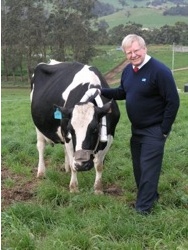
Wine byproduct leads to healthier, greener milk
By Food in Canada staff
Business Operations Research & DevelopmentAustralian researchers test an innovative feed on dairy cows and find dramatic cuts to methane emissions and healthier properties in the milk
Melbourne, Australia – Researchers in Australia have found an innovative way to cut methane emissions released by dairy cows.
Scientists at the Department of Primary Industries (DPI) tested a feed that comprised the stems, seeds and skins from wine grapes.
The scientists found that the feed increased milk production by five per cent, cut methane emissions by 20 per cent and increased healthy fatty acids in the cows’ milk.
The cut to emissions is thought to be the largest reduction of its kind ever attained through the use of a feed supplement.
Results stun scientists
The scientists had supplemented the diet of dairy cows with five kilos of dried grape marc over 37 days and compared the results with other animals fed conventional feed.
They then measured the cows’ milk yields, milk composition and methane emissions.
Peter Moate, a scientist at DPI, says the researchers were stunned with the results.
More healthy fatty acids
“We now know that supplementing dairy cows’ diet with dried grape marc increases the healthy fatty acids in milk by more than six times that of standard autumn fodder,” says Moate.
“These particular fatty acids are extremely potent in their ability to benefit heart health and are also known to help fight cancer, diabetes and arthritis.”
Moate adds that there were early indications that cows fed grape marc produced milk with higher levels of healthy antioxidants and that further tests were being conducted to verify this.
Further benefits
He said on top of the cuts to emissions and the potential health benefits for milk drinkers, the discovery could also benefit the wine industry by finding an effective use for the waste product.
DPI’s research is part of a wider program looking at the use of feed supplements – such as brewers grains, cold-pressed canola meal, cottonseed meal and hominy meal – to reduce methane emissions while supporting milk production.
Print this page
